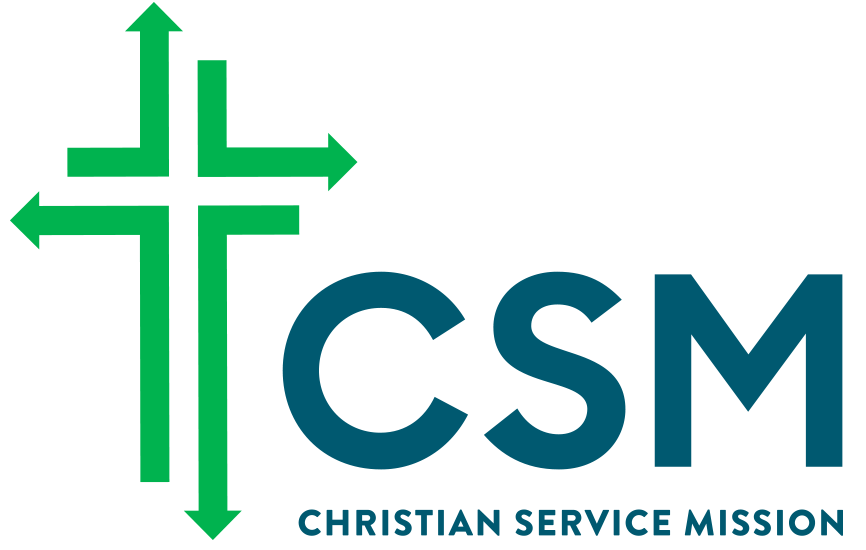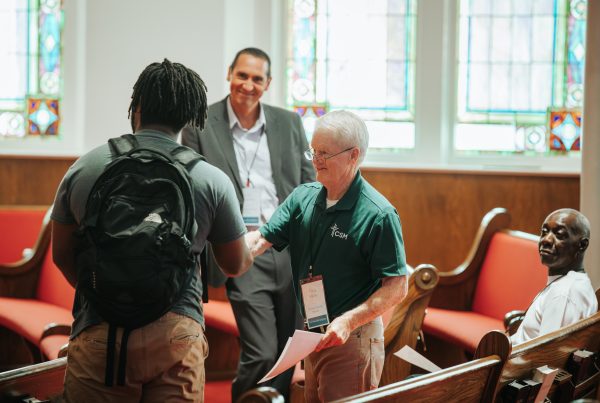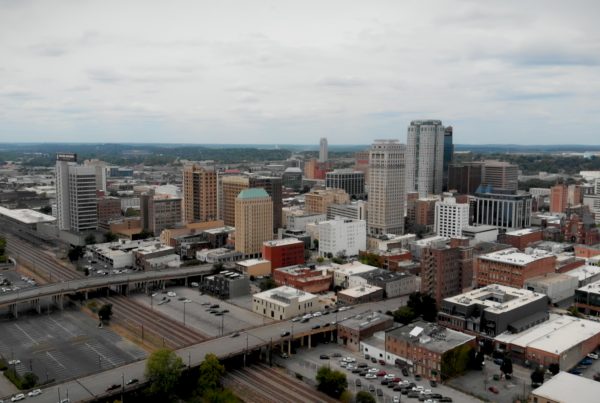During the 1960s, the violent law enforcement response to civil rights protest marches made Birmingham, Alabama, the epicenter of the civil rights struggle. More than 50 years later, the killings of George Floyd, Breonna Taylor, Rayshad Brooks and Ahmaud Arbery have brought forth demonstrations of deep anguish, fear, sadness, and rage in communities across the nation. Here in Birmingham, we know all too well that these are just the latest manifestations of our country’s long–standing sin of racism.
On April 16, 1963, Dr. Martin Luther King Jr. composed his “Letter from the Birmingham Jail.” It was addressed to “My Dear Fellow Clergymen,” and in it, King admonished white churches for acting as bystanders in the civil rights struggle: “So often the contemporary church is a weak, ineffectual voice with an uncertain sound. So often it is an archdefender of the status quo.”
As we face another potential turning point in our country’s struggle toward racial equality and justice, will white clergy and white churches take this historic opportunity to respond more forcefully and righteously than they did in 1963? A good starting point is a cornerstone of Christian values: “‘Love the Lord your God with all your heart and with all your soul and with all your mind.’ … And the second is like it: ‘Love your neighbor as yourself.’” (Matthew 22:36-39).
Unfortunately, we too often limit our definition of “neighbors” to those who look, think, and vote like us, just as Jesus described in Luke 10 in the parable of the good Samaritan. As King famously pointed out, “the most segregated hour in America is eleven o’clock on Sunday morning,” and churches remain among the most segregated aspects of American life. But for white Christians to truly be partners in confronting racism, our notion of whom we embrace as neighbors must expand. The American church, particularly the white church, has an opportunity to guide its congregations in this project through a strategy of intentionality that centers around embracing a clear narrative of our country’s racial history, active listening, and open dialogue.
First, we must strip the romanticized veneer from the narrative of American history. This reckoning with the racism that pervades our past is being done very effectively by organizations like the Birmingham Civil Rights Institute, which houses a replica of the cell door behind which King penned his famous letter, and the National Memorial for Peace and Justice in Montgomery, which commemorates the victims of lynching and chronicles the ideology of white supremacy in the United States. By confronting the deep, unvarnished narrative of America’s racial history, white Christians can better comprehend how black Americans process events like the killings of unarmed black men and women by police today.
King, like Christ, was especially concerned about those who seek to maintain the status quo instead of living out the true creeds of their faith. He remarked in his letter, “I have almost reached the regrettable conclusion that the Negro’s great stumbling block in his stride toward freedom is … the white moderate, who is more devoted to ‘order’ than to justice; who prefers a negative peace which is the absence of tension to a positive peace which is the presence of justice …” To truly understand the aspirations of African Americans—as well as the structural barriers that stand in their way—white clergy and Christians must engage in meaningful dialogue with African Americans and, crucially, actively listen without judgment and defensiveness.
However, these first two cannot happen without intentional effort by all Christians to engage with people from different backgrounds. In America today, African Americans and other minorities have no choice but to live in the majority’s culture. Members of the majority must choose to understand minority cultures. White clergy can help build bridges between their congregations and people from different backgrounds, facilitating the personal connections that are key to creating meaningful change both on an individual level and a systemic one.
As long as we continue to ignore systemic racism, America can never achieve its fullest measure of greatness. In the words of King, “Human progress never rolls in on wheels of inevitability; it comes through the tireless efforts of men willing to be co-workers with God, and without this hard work, time itself becomes an ally of the forces of social stagnation.” Should they choose to seize this moment, white churches can be on the vanguard of a new movement toward true racial reconciliation and justice.
In Birmingham, we the undersigned intend to do so, pursuing the cause of justice in word and deed. We invite our fellow Americans to join us in this commitment.
Lead Authors:
Thomas Wilder, senior pastor of Bethel Baptist Church of Collegeville
Tim Kallam, senior pastor of Mountain Brook Community Church
Selwyn Vickers, M.D., FACS, Christian Service Mission board member
Tracy Hipps, executive director of Christian Service Mission
We acknowledge that the list of co-signers is not inclusive of all churches or faith organizations in Greater Birmingham. For those who have not yet had an opportunity to sign, we invite you and all those across the state of Alabama who wish to join with us, to do so. Send an e-mail to info@csmission.org to add your name to those who stand for true racial reconciliation and justice.
Co-signers:
Dr. David Adkison, M.D., Christian Service Mission board member
David F. Austin, senior pastor of Unified Fellowship Community Baptist Church
Rev. Steven Baccus, senior pastor of Gardendale-Mt. Vernon United Methodist Church
Dr. Thomas Beavers, senior pastor of New Rising Star Church
Bart Box, senior pastor, Christ Fellowship Church
Tommy Brigham, chairman of ARK Realty and the ARK Fund
Joel Brooks, lead pastor of Redeemer Community Church
Rev. Dr. Nate Brooks, pastor, Greater St. John Baptist Church
Joel Busby, lead pastor of Grace Fellowship
John Cantelow III, senior pastor of Sixth Avenue Baptist Church
Todd Carlisle, Christian Service Mission board member
Damon Davis, senior pastor of Collective Community Church
Chris DeGreen, senior pastor of Christ the King Lutheran Church
Keith Duke, Christian Service Mission board member
Dr. David Eldridge, senior pastor of Dawson Memorial Baptist Church
Bob Flayhart, senior pastor of Oak Mountain Presbyterian Church
John Gibson, executive director of Serving You Ministries
Alton Hardy, senior pastor of Urban Hope Church
Robert Holmes, elder at Sixth Avenue Baptist Church
Steve Longenecker Pastor Grace and Truth Church
Robert Marks, M.D., MPH, elder at Sixth Avenue Baptist Church
Matt Mason, senior pastor of The Church at Brook Hills
Leon Miller, pastor of Kingdom Family Christian Fellowship
Adam Mixon, senior pastor of Zion Springs Baptist Church
Dr. Randy Norris, senior pastor of The Station Church
Dr. Rob Paul, Huffman Baptist Church
Andrew Pearson, dean and rector of Cathedral Church of the Advent
Robert Record, M.D., founder and CEO of Christ Health Center
Dr. Harry L. Reeder III Senior Pastor Briarwood Presbyterian Church
Ike Reeder, President of Birmingham Theological Seminary
William Seigel, Christian Service Mission board member
Rodney Standfield, senior pastor of Love Fellowship Christian Center
John Stein, Christian Service Mission board member
Tim Tomlinson, president, Bethlehem College & Seminary, Minneapolis, Minn.
Jimbo Tucker, lead pastor of Redstone Church
Dr. Michael Wesley Sr., senior pastor of Greater Shiloh Missionary Baptist Church
Dr. Andrew Westmoreland, President of Samford University
George Whitlock III, bishop at The Vine Birmingham
Dr. Danny Wood, senior pastor of Shades Mountain Baptist church
Miguel Zayas, senior pastor of Inverness Vineyard Church
Pastor Chris Hodges, Church of the Highlands
William S. “Buddy” Cox III, Partner at Bradley Law Firm
Dr. Seth Landefeld, Holy Family Christo Rey High School Board Member
Matt Francisco, Pastor of Discipleship, Redeemer Community Church
Chad Granger, Assistant Pastor, Urban Hope Community Church
Jason Zinn, Area Director, Young Life Birmingham Central
Dr. Todd Harringon, Pastor, Haven Field Community Church
Reverend Rich Webster, Saint Luke’s Episcopal Church
John Beatty, Area Director, Young Life Birmingham South
Tanesha Sims
Roger Smalligan, member Rock Family Worship, Huntsville, AL
The Rt. Rev. John McKee Sloan, Bishop of the Episcopal Diocese of Alabama
Reverend Glenda S. Curry, Bishop-elect in the Episcopal Diocese of Alabama
Amanda Ingram
Reverend Mary Bea Sullivan, Interim Rector, All Saints Episcopal Church
Reverend Dr. Malcolm L. Marler, Sr Director, Department of Pastoral Care, UAB Medicine
Jim Dye, COO, Realty South
Jamie Barnhart Leo, Christian Service Mission
Alonza Jones, President, Biblical Marriage Institute
Gilbert E. Johnston, Jr
Michael Sillers
Reverend Douglas M. Carpenter, retired, Episcopal Priest
Pastor Joe Elmore, retired, United Methodist
Chuck Clarke
Chris Jones, Senior Pastor, Meadow Brook Baptist Church
Pastor Van A Phillips, Sr. Holy Trinity WOM and Principal at Center Point High School
John S. Woods, Music and Worship Pastor, Dawson Memorial Baptist Church
Reverend Mary Wade, Executive Director, International House of Ethnic Religious Peace and Reconciliation
Dr. Buddy Gray, Senior Pastor, Hunter Street Baptist Church
Kermit Kendrick, Hoover City Schools Board Member
Jeff Friedlander, Director, Be One Ministries
Chris Roe, Executive Director of Encounter Ministries/UAB Campus House
Jeff James, Senior Pastor, Green Valley Church
Charles Little, Board Member, Birmingham Metro Campus Ministry
Rev Cody U Watson Jr., Associate of Frontier Fellowship
Norman E Dixon, Youth Minister of Bethel Baptist Church
Chris Goins, Pastor, A2 Church
Photo by Zach Searcy





